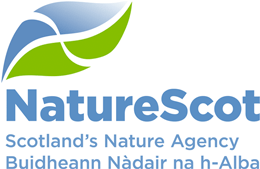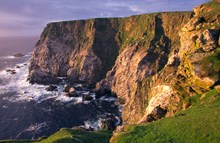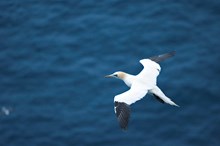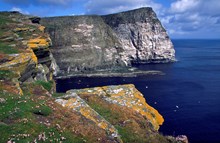16 December, 2024
Seabird recovery slow at Shetland National Nature Reserves
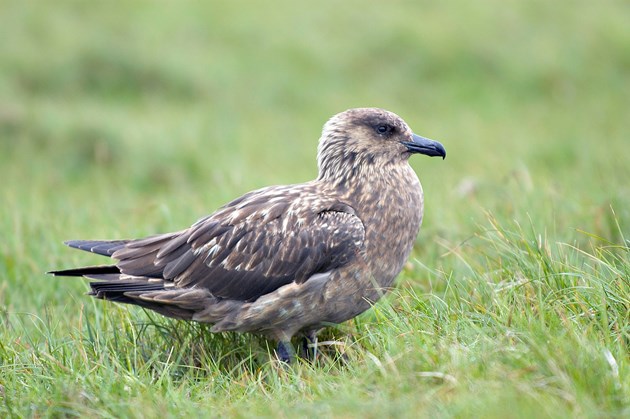
Numbers of great skua or bonxies at Shetland National Nature Reserves (NNRs) increased slightly this year but remain significantly below pre-avian flu levels.
A full census of the species, for which Shetland is a global stronghold, was carried out at NatureScot’s Hermaness and Noss NNRs this year to see how populations are faring after the devastating impact of the virus in 2022.
At Hermaness 220 breeding pairs were counted, a small increase from 208 in 2023 but still down a huge 77% on the 955 counted in 2018, the last full census before the outbreak.
Meanwhile the Noss count found 80 pairs of bonxie, up from 69 in 2023 but a drastic decline of 83% from 476 in 2018.
While a full count was not carried out this year, numbers of gannets, a species that was also hit badly by bird flu, were observed to be slightly up at Hermaness in 2024. However, again it is estimated that the previous upward trend in this species has been set back by 20 years at the reserve. Gannets reached 29,562 nests in 2021 pre-bird flu but were down to 18,739 nests at the last census in 2023.
Thankfully there was only one positive case of avian flu in seabird populations at the reserves during the breeding season. NNR staff are remaining vigilant however, after a small number of positive tests in great black-backed gull and bonxie at the end of the season. These have been confirmed as the H5N5 strain of avian flu, in contrast to the H5N1 strain of 2022.
Juan Brown, NatureScot Operations Officer, said: “This year’s seabird census reveals the ongoing impact of the avian flu outbreak in 2022 and the painfully slow recovery of these populations which are likely to take years, if not decades, to reach pre-outbreak levels once again.
“In contrast to recent years, the small number of positive avian flu tests we have had this year have all been the H5N5 strain of the virus, rather than H5N1. While we don’t yet know what the impact of H5N5 will be on wild bird populations, we are keeping a close eye on the situation and encourage people to report all sightings of sick or dead birds using the GB online reporting system. Sightings will help us track the spread of the virus and assess impacts on wild bird populations.”
In what was generally a poor breeding season for seabirds overall, there was better news for storm petrels at Noss. A total of 35 birds responded to call recordings played next to potential nest holes during a survey this year - the highest since this secretive seabird was found breeding on Noss in 2008. As only a proportion of birds respond, the population will be significantly bigger.
In other good news, Hermaness welcomed its highest visitor numbers on record, with more than 13,000 people enjoying the reserve, including local school groups and guided walks. This continues the upwards trend over the past four years, which have also seen new visitor facilities installed.
At Noss visitor numbers returned to normal levels for the first time since Covid, despite the ferry not running on an unprecedented number of days due to bad weather. Visitors who made the crossing were able to enjoy the newly completed interpretation panels at the Visitor Centre.
ENDS
Contact information
- Name
- NatureScot Media
- Telephone
- 0131 316 2655
- media@nature.scot
Notes to editors
Find out more about Hermaness and Noss National Nature Reserves.
There are 43 National Nature Reserves in Scotland. These are special places that look after some of the best of Scotland’s nature on behalf of everyone who lives or visits Scotland, and they provide unique opportunities to visit, enjoy and learn more about Scotland’s nature. For more information, see see www.nnr.scot.
NatureScot is Scotland's nature agency. We work to enhance our natural environment in Scotland and inspire everyone to care more about it. Our priority is a nature-rich future for Scotland and an effective response to the climate emergency. For more information, visit our website at www.nature.scot or follow us on X at https://x.com/NatureScot
’S e NatureScot buidheann nàdair na h-Alba. Bidh sinn a’ neartachadh àrainneachd na h-Alba agus a’ brosnachadh dhaoine gu barrachd suim a chur ann an nàdar. Tha e mar phrìomhachas againn gum bi nàdar na h-Alba beairteach agus gun dèilig sinn gu h-èifeachdach le èiginn na gnàth-shìde. Tha an tuilleadh fiosrachaidh aig www.nature.scot no air X aig https://x.com/NatureScot
